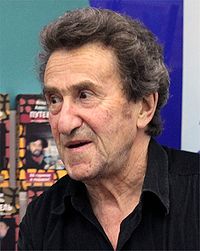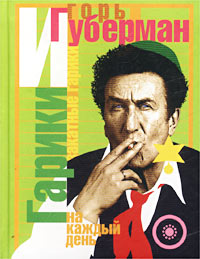
Igor Guberman
Encyclopedia


Big-character poster
Big-character posters are handwritten, wall-mounted posters using large-sized Chinese characters, used as a means of protest, propaganda, and popular communication. They have been used in China since imperial times, but became more common when literacy rates rose after the 1911 revolution...
") always feature an a-b-a-b rhyme scheme
Rhyme scheme
A rhyme scheme is the pattern of rhyme between lines of a poem or song. It is usually referred to by using letters to indicate which lines rhyme. In other words, it is the pattern of end rhymes or lines...
, employ various poetic meters
Meter (poetry)
In poetry, metre is the basic rhythmic structure of a verse or lines in verse. Many traditional verse forms prescribe a specific verse metre, or a certain set of metres alternating in a particular order. The study of metres and forms of versification is known as prosody...
, and cover a wide range of subjects including antisemitism, immigrant life, anti-religious sentiment, and the author's love-hate relationship with Russia
Russia
Russia or , officially known as both Russia and the Russian Federation , is a country in northern Eurasia. It is a federal semi-presidential republic, comprising 83 federal subjects...
.
Biography
Igor Guberman was born in Kharkov on July 7, 1936. After high school, he entered the Moscow State University of Railway EngineeringMoscow State University of Railway Engineering
Moscow State University of Railway Engineering is the leading and largest higher education institution in the field of railway transport in Russia with more than 17,000...
where, in contrast to a number of more prestigious Russian universities, there was not a maximum quota for Jews. In 1958, he graduated with a degree in Electrical Engineering
Electrical engineering
Electrical engineering is a field of engineering that generally deals with the study and application of electricity, electronics and electromagnetism. The field first became an identifiable occupation in the late nineteenth century after commercialization of the electric telegraph and electrical...
. He worked as an electrical engineer for several years and wrote on the side in his spare time. Toward the end of the 1950s, he was introduced to Alexander Ginzburg
Alexander Ginzburg
Alexander Ilyich Ginzburg , was a Russian journalist, poet, human rights activist and dissident.During the Soviet period, Ginzburg edited the samizdat poetry almanac Sintaksis. Between 1961 and 1969 he was sentenced three times to labor camps...
, who published Syntax, one of the first samizdat
Samizdat
Samizdat was a key form of dissident activity across the Soviet bloc in which individuals reproduced censored publications by hand and passed the documents from reader to reader...
periodicals, as well as to other underground philosophers, writers, and artists. For some time he worked as a secretary to the great Russian poet David Samoylov
David Samoylov
David Samoylov , pseudonym of David Samuilovich Kaufman . He is a notable poet of War generation of Russian poets, and considered one of the most important Russian poets of the post-World War II era.-External links:* * *...
, and also as a ghostwriter
Ghostwriter
A ghostwriter is a professional writer who is paid to write books, articles, stories, reports, or other texts that are officially credited to another person. Celebrities, executives, and political leaders often hire ghostwriters to draft or edit autobiographies, magazine articles, or other written...
for hire.
At first, Guberman wrote popular science books (such as "Third Triumvirate"), but he gradually became more and more active as a dissident
Dissident
A dissident, broadly defined, is a person who actively challenges an established doctrine, policy, or institution. When dissidents unite for a common cause they often effect a dissident movement....
poet. Guberman published his underground work under the pseudonym
Pseudonym
A pseudonym is a name that a person assumes for a particular purpose and that differs from his or her original orthonym...
s I. Mironov and Abram Khayyam, connecting the names of the famous Persian
Iran
Iran , officially the Islamic Republic of Iran , is a country in Southern and Western Asia. The name "Iran" has been in use natively since the Sassanian era and came into use internationally in 1935, before which the country was known to the Western world as Persia...
poet Omar Khayyám
Omar Khayyám
Omar Khayyám was aPersian polymath: philosopher, mathematician, astronomer and poet. He also wrote treatises on mechanics, geography, mineralogy, music, climatology and theology....
and the Jewish first name Abram.
In 1979, Guberman was arrested and sentenced to five years in the Labor Camps
Gulag
The Gulag was the government agency that administered the main Soviet forced labor camp systems. While the camps housed a wide range of convicts, from petty criminals to political prisoners, large numbers were convicted by simplified procedures, such as NKVD troikas and other instruments of...
. He based his book, Walks Around the Barracks (written in 1980, published in 1988), on the diaries he kept during his time in the Gulag.
In 1984, the poet returned from Siberia
Siberia
Siberia is an extensive region constituting almost all of Northern Asia. Comprising the central and eastern portion of the Russian Federation, it was part of the Soviet Union from its beginning, as its predecessor states, the Tsardom of Russia and the Russian Empire, conquered it during the 16th...
. For a long time, he could get neither a job nor a residence permit (Propiska
Propiska
Propiska was both a residence permit and migration recording tool in the Russian Empire before 1917 and from 1930s in the Soviet Union. It was documented in local police registers and certified with a stamp in internal passports....
) to live in Moscow. In 1987, Guberman emigrated from the USSR, and since 1988 he has been living in Jerusalem. He returns to Russia quite frequently to attend poetry readings. Books by Guberman have sold hundreds of thousands of copies in Russia and in countries with Russian immigrant communities, with whom they are always popular.
Quatrains
A typical example of a Guberman quatrain:Надежды нет, и мир суров.
Что делать бедному еврею?
Я продаю свое перо,
И жаль что пуха не имею.
Literal translation
Hope is scarce, and the world is harsh.
What is a poor Jew to do?
And so I now sell my quill,
Regretting that I have no down*.
'*A play on a Russian expression meaning that the author has no luck.

